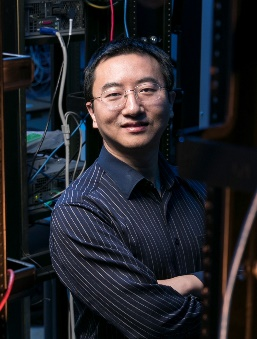Title: Hardening 5G mmWave Wireless Communication Security at Physical Layer
Speaker: Dr. Kai Zeng
时间:2022年6月16日星期四上午9:00am-10:00am(北京时间)
地点:线上腾讯会议(300-595-271)
Abstract:
5G wireless communication technologies are considered as the key enabler of various IoT applications, including autonomous driving, smart manufacturing, virtual reality, smart healthcare, etc. Although there is significant ongoing work on the development of advanced 5G wireless communication techniques, such as mmWave (millimeter wave) and massive MIMO for communication performance enhancement, the security aspects of these 5G wireless communication techniques have not been well explored. This talk discusses the potential of using physical layer properties of mmWave massive MIMO communication for serving critical security functions, i.e., authentication and shared secret key generation. Our study has found that the uniqueness of beam patterns emitted by mmWave devices can be used to identify different mmWave transmitters. The reciprocity of virtual channel information can be applied to generate a shared secret key between mmWave devices under low SNR. In the end of this talk, future research directions on physical layer security of 5G and beyond will be discussed.
Bio:
Dr. Kai Zeng is currently an associate professor in the Department of Electrical and Computer Engineering at George Mason University (GMU), and is affiliated with Department of Computer Science and Cyber Security Engineering. He is the director of the Wireless Innovation and Cybersecurity Lab at GMU. He earned his Ph.D. degree in electrical and computer engineering at Worcester Polytechnic Institute (WPI), and both a M.S. in communication and information systems and a B.S. in communication engineering from Huazhong University of Science and Technology, China. Dr. Zeng received an NSF CAREER award in 2012, the Excellence in Postdoctoral Research award from the University of California, Davis in 2011, and the Sigma Xi Outstanding Ph.D. Dissertation award at Worcester Polytechnic Institute in 2008. He was a visiting faculty member at the Air Force Research Lab in 2013. He has broad interests in cyber security and wireless networking with emphasis on physical layer security, cyber physical systems/IoT security, spectrum sharing, and machine learning applications. His research has been supported by NSF, DARPA, ARO, ONR, NSA, MITRE, and Commonwealth Cyber Initiative (CCI). He is an associate editor of IEEE Transactions on Information Forensics and Security and IEEE Transactions on Cognitive Communications and Networking.



